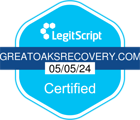What is Prescription Drug Addiction Rehab?
Table of Contents
- What is Prescription Drug Addiction?
- The Most Commonly Abused Prescription Drugs
- Prescription Drug Addiction Side Effects, Risk Factors, and Dangers
- Signs and Symptoms of Prescription Drug Addiction
- Prescription Drug Addiction Rehab
- Treatment for Prescription Drug Addiction at Great Oaks Recovery Center
- Resources
Questions About Treatment?
Our knowledgeable team is ready to discuss your situation and options. Your call is confidential with no obligation required.
What is Prescription Drug Addiction?
Prescription drug abuse occurs when taking medication in a way that a doctor does not prescribe. This can mean taking a prescription medication at higher doses, for a longer duration than prescribed, or for recreational purposes to get high. Abuse of prescription medication will lead to prescription medication addiction and dependence developing over time. Someone addicted to prescription medication will continue to keep taking it despite the negative consequences on their lives.
Prescription Drug Addiction Statistics
According to the National Center for Drug Abuse, prescription drugs are the third most abused illegal substance in the U.S. 16.3 million Americans misuse prescriptions each year. 4 out of 5 pharmacy-filled prescriptions are opioids, accounting for 43% of prescription drug misuse. These statistics show that addiction to prescription drugs is serious and very prevalent in the U.S. If you or someone you know is struggling with a prescription medication addiction, there are resources available that can help.1
What Makes Prescription Drugs Addictive?
When someone takes a prescription drug for an extended period or misuses it by taking it at high doses, the body will begin to adapt to having drugs in its system. Prescription drug misuse can build a tolerance to a drug that requires higher doses to be taken to receive the same effects, or dependence may form on the substance that makes someone feel like they can’t function normally without taking it. When someone takes a prescription drug at high doses for a long period, they will develop an addiction to prescription drugs.

The Most Commonly Abused Prescription Drugs
The most abused prescription drugs are opioids, central nervous system depressants, and stimulants. These are drugs commonly prescribed for medical conditions and have a high potential for abuse.
Opioids
Opioids are among the most highly prescribed types of prescription drugs in the U.S. Millions of people will receive prescriptions for opioid painkillers each year. While opioid painkillers have many medical uses, they can also be highly addictive if misused or abused. Taking prescription opioids for a long period can also lead to dependence and a higher likelihood of prescription medication addiction.
Central Nervous System (CNS) Depressants
Sedatives and tranquilizers are also prescription drugs that may be highly abused. CNS depressant medications include benzodiazepines, barbiturates, and certain sleep medications. While many of these medications have positive medical uses, they’re usually only recommended to be taken for a short period to avoid developing an addiction to prescription drugs.
Stimulants
Prescription stimulants such as Adderall and Ritalin are also commonly abused substances. Stimulant drugs are often prescribed to treat ADHD (attention deficit hyperactivity disorder). However, stimulants are also commonly abused recreationally as a party drug or by students as a study drug.
Prescription Drug Addiction Side Effects, Risk Factors, and Dangers
There are many side effects, risks, and dangers associated with prescription medication addiction. The impact of prescription drug abuse can be dangerous and may have lifelong health consequences.
Short Term Effects of Prescription Drugs
Common short-term side effects of prescription drugs include:
- Accelerated or decelerated heart rate
- Constipation
- Drowsiness
- Increase in body temperature
- Nausea
- Respiratory depression
- Visual disturbances
Long Term Effects of Prescription Drugs
Common Long-term side effects of prescription drugs include:
- Drug dependence and addiction
- Increased risk of overdose
- Long-term health issues in the heart, liver, and kidneys
- Significant weight loss or gain
- Tolerance
- Withdrawal symptoms when you stop taking them
Prescription Drug Addiction Risk Factors
Many common risk factors can lead to someone developing a prescription drug addiction. Risk factors of addiction can be genetic, environmental, or social factors. Genetics can play a role in someone’s likelihood of developing an addiction. If someone has a family history of addiction, it’s much more likely that they could also develop an addiction. Environment is also a big influencer of addiction since being around heavy drug use can influence someone to do the same. Lastly, social factors like peer pressure can also influence someone to abuse drugs.
Prescription Drug Addiction Dangers
There are many common dangers associated with prescription drug abuse. Taking prescription drugs at high doses can lead to significant impairment, leading to risky behavior or taking actions that have negative consequences. Prescription drug addiction also has a high risk of fatal overdose and other long-term health consequences that can have lifelong effects.
Signs and Symptoms of Prescription Drug Addiction
If you’re wondering if you or someone you care about is struggling with prescription drug addiction, you can look for common prescription drug addiction symptoms.
Common Signs of Prescription Drug Addiction
Common prescription drug addiction symptoms may differ depending on the type of drug being abused.
Opioids
When someone struggles with prescription opioid addiction, they’ll likely show regular signs of drowsiness, changes in sleep habits, decreased motivation, and an inability to control opioid use. Abuse of opioid painkillers can be common in those who have been prescribed them for injuries or other health conditions. 2
CNS Depressants
When someone takes a CNS depressant at high doses, it will slow down brain activity and produce feelings of drowsiness and relaxation. Common signs that someone is addicted to CNS depressants are drowsiness, slurred speech, confusion or disorientation, reduced inhibitions, and dilated pupils. 3
Stimulants
When someone struggles with stimulant addiction, they may appear more shaky, jittery, or on edge. Increased feelings of paranoia or anxiety may also occur because of stimulant addiction.
Other Signs of Prescription Drug Addiction
Other common signs of prescription drug addiction include:
- Avoiding enjoyable activities
- Financial problems
- Having trouble at work or school
- Lack of motivation
- Legal problems
- Multiple doctors’ visits trying to get prescription drugs
- Relationship problems
- Withdrawing from social situations

Prescription Drug Addiction Rehab
If you or someone you know is struggling with addiction to prescription drugs, rehab for prescription drug addiction can help.
What Is Prescription Drug Addiction Rehab?
Rehab for prescription drug addiction involves detox, therapy, and working on life skills to cope with the stresses of life without the use of drugs and alcohol. During rehab, you’ll go through a prescription drug recovery program that will help you detox and get the drugs out of the body’s system while working with treatment professionals to build skills that will help you maintain sobriety and get back to everyday life.
Prescription Drug Addiction Rehab Programs
If you’re looking for prescription drug addiction treatment, many rehab programs are available that can help. Deciding on the right type of rehab program will depend on the individual’s needs and the type and severity of the addiction.
Prescription Drug Addiction Rehab Programs
If you’re looking for prescription drug addiction treatment, many rehab programs are available that can help. Deciding on the right type of rehab program will depend on the individual’s needs and the type and severity of the addiction.
Prescription Drug Detox
Detox is one of the first steps in a prescription drug addiction treatment program. The detox process will help you get the drugs out of the body’s system to begin focusing on recovery. During detox, you’ll likely experience withdrawal symptoms that range from uncomfortable to severe. Due to the severity of some withdrawal symptoms, it’s recommended that you get a medically supervised detox at a drug detox center to ensure you are as safe and comfortable as possible during this process.
Inpatient Treatment
Inpatient treatment involves staying at a treatment center for a duration of time while working through a treatment program. During inpatient treatment, you’ll have around-the-clock medical attention available, and you’ll be in a safe and structured environment that will help you focus on recovery.
Outpatient Treatment
Outpatient treatment can also be a good option for those who have less severe addictions or who don’t want to leave behind work or family responsibilities while receiving prescription drug addiction treatment. Outpatient treatment will require you to report to a treatment center at designated times throughout the week while working through a recovery program. Outpatient treatment isn’t for everyone since it requires additional accountability to keep going to treatment sessions and self-manage your recovery at times.
Behavioral Therapy
Some form of behavioral therapy is common in most addiction treatment programs. During behavioral therapy, you’ll work with your therapist to develop skills for managing your addiction and work on any underlying conditions that may be causing the addiction to occur.
Medication
Medications may also be used during treatment to help manage withdrawal symptoms or prevent relapse. Medications used during treatment have been scientifically studied and have shown to get positive results during addiction treatment. 4
Treatment for Prescription Drug Addiction at Great Oaks Recovery Center
If you or someone you know is looking for prescription drug addiction treatment options, Great Oaks Recovery Center can help. Great Oaks offers several services that can help you recover from prescription drug addiction and get on the path to maintaining long-term sobriety.
Detoxification
Great Oaks offers detoxification services that will help you begin the recovery process. During detox at Great Oaks, you’ll be surrounded by supportive treatment professionals who will be there for you every step of the way. Treatment professionals at Great Oaks Recovery Center are educated and trained to make the detox process as easy and comfortable as possible.
Residential Prescription Drug Addiction Treatment Program
Great Oaks also offers a residential prescription drug addiction treatment program. During residential prescription drug treatment at Great Oaks, you’ll work with licensed therapists and other supportive staff members to build life skills and achieve goals throughout the treatment program.
Get Help for Prescription Drug Addiction
If you’re looking to get help for prescription drug addiction, you can contact us today at (713) 769-0102 for more information.
Resources
- https://drugabusestatistics.org/prescription-drug-abuse-statistics/
- https://www.hopkinsmedicine.org/opioids/signs-of-opioid-abuse.html
- https://www.addictioncenter.com/drugs/drug-classifications/central-nervous-system-depressants/
- https://nida.nih.gov/publications/principles-adolescent-substance-use-disorder-treatment-research-based-guide/evidence-based-approaches-to-treating-adolescent-substance-use-disorders/addiction-medications
Questions About Treatment?
Our knowledgeable team is ready to discuss your situation and options. Your call is confidential with no obligation required.
Copyright © 2022 Great Oaks Recovery Center | Privacy Practices | Sitemap | Site by Active Marketing





